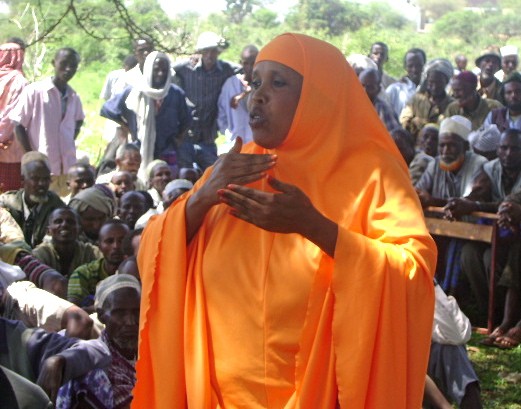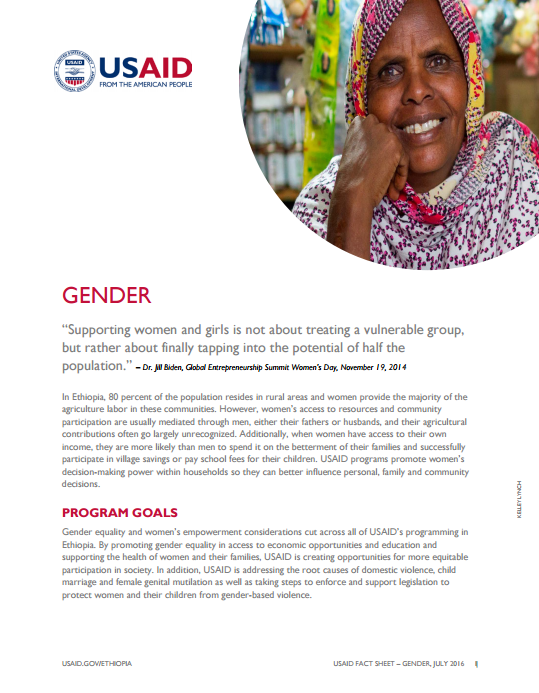
In Ethiopia, 80 percent of the population resides in rural areas and women provide the majority of the agriculture labor in these communities. However, women’s access to resources and community participation are usually mediated through men, either their fathers or husbands, and their agricultural contributions often go largely unrecognized. Additionally, when women have access to their own income, they are more likely than men to spend it on the betterment of their families and successfully participate in village savings or pay school fees for their children. Our programs promote women’s decision-making power within households so they can better influence personal, family and community decisions.
Gender equality and women’s empowerment considerations cut across all of our programming in Ethiopia. By promoting gender equality in access to economic opportunities and education and supporting the health of women and their families, we are creating opportunities for more equitable participation in society. In addition, we are addressing the root causes of domestic violence, child marriage and female genital mutilation as well as taking steps to enforce and support legislation to protect women and their children from gender-based violence.
Increasing Female Educational Opportunities
Although the primary school enrollment rate of girls in Ethiopia has increased from 21 to 49 percent in the last two decades, the majority are unable to transition to secondary and tertiary school due to distance, personal security and economic challenges. As girls grow older, academic participation becomes increasingly difficult as it takes time away from essential income generating activities. The percentage of female students enrolled in university is only 30 percent and five percent drop out in the first year. At the same time, female-led instruction at the university level is extremely low at only 10 percent. To tackle these challenges and better support the continued education of the next generation of female Ethiopian leaders, our Reading for Ethiopia’s Achievement Developed activity focuses on improving girls’ and boys’ reading skills in primary schools. We work with government counterparts to engage more women and girls. We provided supplementary reading materials and purposefully supported girls’ participation in reading clubs to enhance learning performance and increase retention.
Expanding Economic Opportunities for Women
Women often face different and more basic economic constraints than men, linked to a lack of access to credit and lower demand for their products because of marketing inexperience. To support women’s ability to create businesses and secure their own livelihoods, we encourage financing for female-owned businesses through the Development Credit Authority. To support women in agriculture under the Feed the Future initiative, we established the Women in Agribusiness Leadership Network to enhance leadership role of women and empower women in decisions about production, the use of productive resources (land, water, capital), control over income and time use. We support women in chronically food insecure households by boosting access to improved farming inputs and creating income earning agricultural activities.
Promoting the Health and Safety of Women and Girls
According to the Ethiopian Demographic and Health Survey in 2011, almost a quarter of Ethiopian women do not make decisions on most individual and family issues. Instead, their husbands make decisions for them on choices including the option to use birth control methods, and whether to give birth in a health facility or seek the assistance of a trained provider. Additionally, harmful traditional practices—early marriage and childbearing, female genital mutilation and gender-based violence—all having huge adverse effects on Ethiopian women. Through the President’s Emergency Plan for AIDS Relief (PEPFAR), we address the HIV risks associated with early marriage. We also provide medical assistance for women and girls suffering from fistula, a birth injury common in very young mothers, and educate communities about the health risks of female genital mutilation. To boost maternal and newborn health, we support primary health care to end preventable child and maternal deaths and teach women about nutrition through Feed the Future activities. Additionally, we support the capacity of local Ethiopian law enforcement agencies to enforce laws banning gender-based violence.
Increasing Women’s Roles in Conflict Prevention and Peacemaking
Conflict prevention and mitigation activities, support women’s peace building networks; provide women with conflict prevention training, conflict resolution practices and an outlet for healing and forgiveness. Activities facilitate the formation of regional women’s peace forums to ensure that women and men are contributing equally to peace building processes. Women who received leadership training are now participating with increased confidence within community peace structures.
Activities
Featured Articles
-
Livestock Production: Empowering Women in Ethiopia [Impact Blog]
-
Empowering Women Through Agricultural Development in Ethiopia [Transforming Lives]
-
USAID Revives Boys and Girls Scouts in Ethiopia [Transforming Lives]
-
The Female "Army" Leading Ethiopia's Health Revolution [Frontlines]
Videos
-
Promoting the Inclusion of More Women Members in Farmers' Cooperatives [5:39]
- Women's Land Rights: A Ripple Effect [19.12]
Related Resources
-
USAID Gender Equality and Female Empowerment Policy [PDF, 2.8MB]
-
Strengthening Economic Growth Through Investments in Gender Equality [PDF, 257KB]
-
Ending Child Marriage & Meeting the Needs of Married Children: The USAID Vision for Action [PDF, 618KB]
Related News
-
Loan Agreement Will Increase Access to Finance for Ethiopian Businesswomen (September 29, 2016)
-
Annual Conference Celebrates Women Agribusiness Leaders (January 13, 2016)
-
USAID Provides Business and Leadership Training for Women in Agribusiness (September 8, 2015)
-
USAID Trains 63 Women to Succeed as Dairy and Livestock Entrepreneurs (June 19, 2015)
-
U.S. Government Celebrates International Women’s Day (March 5, 2015)
-
USAID Graduates More Than 100 Women Trained in Entrepreneurship and Leadership (February 28, 2015)
-
USAID Celebrates Women Leaders in Agribusiness (January 21, 2015)
-
USAID Announces New Resources to Prevent Child, Early, and Forced Marriages (July 22, 2014)
-
Remarks by U.S. Ambassador Donald Booth: Commencement of the University Preparation Camp for Ethiopian Young Women (December 5, 2012)









Comment
Make a general inquiry or suggest an improvement.